From Katya: I was recently watching a Twitch stream with Cozy K when my favorite thing happened: people discussing literary criticism in the wild. This NEVER happens. Cozy K and her chat, affectionately called the Poopies, were discussing “Booktok, brainrot, and why it’s okay to be a hater” by alisha not alihsha on YouTube. She sparked a conversation about book history, Austen, and what “real” readers are—of course I had to watch.
I’m not a hater of alisha not alihsha’s essay. If I were her teacher and that was a final project, I’d have a lot of comments but be thrilled to see someone so engaged with books and thinking about how reading habits impact the world. At her age, I was publishing a literary zine with my friends full of goofy-but-analytical essays to share with each other. Frankly, my writing was probably far worse in quality (definitely more cringe).
The video and responses around it had a common misconception about literary criticism throughout: that we’re essentially fancy book reviewers, sorting the good and the bad books. Maybe it’s a bit of ego since I’m three literary analysis degrees in a trench coat, but I promise that literary criticism can be so much more fun than rating books.

I understand why most people think our job is about “good” and “bad” literature. As a profession, we haven’t done a great job explaining that book reviewers, publishers, and editors are different from us academic weirdos who do literary analysis – even though we’re both called literary critics. The former focus on the business of books where “good” means what sells. The latter focus on understanding what books do—how reading and other ways of consuming media both shape and are shaped by the culture around them.
I can’t remember the last time I read a good piece of literary criticism that cared about whether a book was good or bad. It’s not our job to decide. If it were, Hannah and I wouldn’t have spent hours listening to our Professor Nancy Armstrong, a leading figure in the study of the novel, talking about how understanding Fifty Shades of Grey was critical to the study of the modern novel. She didn’t care whether it was good or not—she cared that it was doing something culturally, and we needed to understand what.
I consider literary criticism to be the analysis of cultural artifacts and their role in society. What do people read, why do they read it, and what kinds of communities spring up around them—and then what does all of that tell us about culture? We start with books, movies, and TV, but we’re really studying people—the media is just way to understand them. I can sympathize with those who think this is a bit stupid. Many people’s exposure to literary analysis begins and ends with high school book reports, memorizing literary terms, and analyzing minute details until your brain drips from your ears. Literary criticism is often taught in a vacuum without connecting it to a broader context in the world; just analysis for analysis’ sake. Which is fine for teaching a skill, I guess, but it’s not very interesting. When many of us on the show get to explain what we really do – the response is often “I wish I could have done that in class!” When people get to study the things that are relevant to them, in ways that make sense of something interesting, they’re a lot less bored.
I’m sure many modern scholars of the romance genre are having an absolute field day on Booktok, the same way I would be scouring Reddit threads and wikis for primary sources. So many readers openly talking about what they read and their experiences is a gold mine. Romance readers have been studied, both as communities and in isolation, for decades. Many complaints leveled against Booktok from critics mirror ideas about romance readers that have existed far longer than TikTok. For example, Janice Radway’s Reading the Romance explores assumptions about women reading romances being anti-intellectual and uncritical, showing that romance readers are actively engaged in the text even if it doesn’t appear so from the outside.
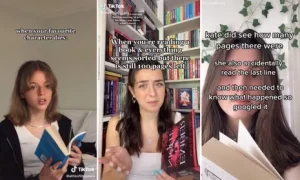
This isn’t to say Booktok is beyond criticism. alisha not alihsha’s critique of Booktok as an example of capitalism’s impact on media is appropriate, even if I would assign responsibility differently. It also doesn’t mean that a researcher’s personal enjoyment is irrelevant. Most researchers I know study what matters to them. But focusing on what I personally enjoy, or don’t enjoy, can get in the way of literary criticism. Taste has been used to marginalize many authors because of their identities, whether the critic was self-aware or not. Amy Kaplan’s Social Construction of American Realism reminds us how authors like Wharton and Howell weren’t called realists because their reality didn’t align with critics’ expectations, preventing them from being considered “serious” writers. Now they’re required reading for anyone studying 20th century American literature.
If alisha not alihsha’s intent with her essay was to get folks thinking about the books they read, she’s succeeded. What do you think about Booktok, reading, and lit crit? Let us know your thoughts in the comments below!
From Mav: I spent last night watching all four of alisha not alihsha’s videos. I have to say, I was actually very impressed. I wasn’t really aware of this controversy at all until Katya brought it to my attention, and I have to say, as an English Lit professor, I would absolutely LOVE to have Alisha in a class. Do I agree with all of her points? No… not at all. But she’s a freshman and I’m a professor. She’s a girl and I’m a boy. She’s uhhh… at least two or three years younger than I am. We’re different races. We’re from different locations. We have different outlooks on life. We SHOULD have different views on content. What made her great was that she was able to articulate her stance with great efficacy even if she had a limited toolset to do it with. Like Katya said, I wish I was this good at 18! I hope she’s an English or Literature or Cultural Studies major and continues to get better!
One thing I noticed about alisha not alihsha’s videos is that she seems… torn(?) between what Katya and I (and other academics) call literary criticism and the book reviews that pass for that on the internet and in magazines and the like. This is what I call the Siskel and Ebert problem. For many people the idea of “criticism” is just being a professional “thumbs up or down” recommender. Ironically, if you actually watched an episode of Siskel & Ebert, or read their columns, that’s not what they actually did. The great part of the show was that Gene and Roger had very different BUT both very educated opinions on how film worked and seeing them discuss the intricacies of what any given film brought to THEM whether good or bad, was part of the brilliance of the show. And they were still reviewers, not academics. It’s just that all anyone remembers now is the “thumbs up and down” and that kinda sucks. And that kind of logic — “how many stars does this book have? What’s the Rotten Tomatoes Score on this movie?” — has sort of infected how a lot of people think about criticism. It’s often about “points” and “scores” rather than analysis. But as a… well, as a professional book and movie nerd basically… I find the analysis part WAY more fun!
I want to note here that I am NOT dissing book (or movie or video game or whatever) reviews. There’s a lot of media out there, and I think there’s definite value in having some people you trust giving you… a “short list” of media that you might try. But, I also think this is a task that *gasp* AI is good for. It’s not like I haven’t been using Amazon, Netflix, and other services recommendation engines for decades. But judging by watching alisha’s videos I think she’s probably MORE interested in actually talking about her arguments about the concepts behind the books she’s consuming — what she calls “critical thinking” — than she is what the book itself is about. Her first video on a her stream is her deconstruction of the concepts of male and female gaze and it’s absolutely excellent for a first semester freshman. Do I have notes… hell yeah, I have notes! As I was watching I thought of like half a dozen articles and books on gaze theory and remediation that I want to be like “oh my god, she needs to read this!!!!” But that’s my job. I teach classes on this! What’s great is that she’s positioning herself in the critical conversation. And I’d love to have her in one of my classes because I think she’d be a valued part of the discourse that would help other students learn as she learned herself.
That’s what criticism — real criticism — is! The point is to have an intellectual conversation that begins with the content and engages with it in order to investigate deeper cultural issues. It allows knowledge to develop both for the person speaking/writing/vlogging and for their consumer. It’s what this show is! It’s why we never have any hard and fast answers when we review anything. It’s why we always end with “so we’ve resolved nothing.” We’re not trying to “resolve it”. We’re trying to START the conversation… or continue it… potentially forever
So yeah, we want to continue that conversation now. So like Katya said, what are your thoughts on literary criticism (or media criticism) in general and things like BookTok in specific?

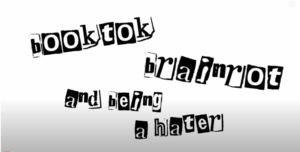
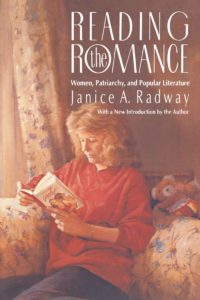
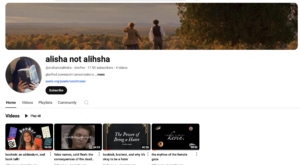
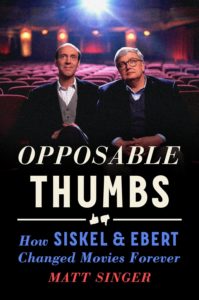
I’ve seen similar discourse about Fantasy and Speculative Fiction (aka Sci-fi) media. Where “book critics” discount anything “Sci-fi” beyond Frankenstein as not worthy of attention. Some people I know encountered professors of Creative Writing courses who refused to consider Sci-fi and Fantasy as part of the curriculum and actively looked down on those who engaged with such. As if writing those genres did not require the same skills as “proper” literature or examination of their subjects.
I was a theatre critic for a brief time, and for my whole stretch I viewed my job to be someone who connects a piece with its audience. That’s of course not all I thought it was, but I really wanted to stay away from absolute (“This is perfect!”/“This is awful”) judgement calls. Instead, wherever possible, I tried to make sure the house for a show was most likely the one that would cheer them on.
The two thoughts that come to my mind about this are A.O. Scott’s book from a while back (nytimes.com/2016/02/21/boo…) which might lean more towards the “Siskel and Ebert” angle than you are interested in … and also Linsday Ellis’ old-ish series about film theory as told through the transformers movies … which is just … a thing.
I’ve seen similar discourse about Fantasy and Speculative Fiction (aka Sci-fi) media. Where “book critics” discount anything “Sci-fi” beyond Frankenstein as not worthy of attention. Some people I know encountered professors of Creative Writing courses who refused to consider Sci-fi and Fantasy as part of the curriculum and actively looked down on those who engaged with such. As if writing those genres did not require the same skills as “proper” literature or examination of their subjects.
I’ve seen similar discourse about Fantasy and Speculative Fiction (aka Sci-fi) media. Where “book critics” discount anything “Sci-fi” beyond Frankenstein as not worthy of attention. Some people I know encountered professors of Creative Writing courses who refused to consider Sci-fi and Fantasy as part of the curriculum and actively looked down on those who engaged with such. As if writing those genres did not require the same skills as “proper” literature or examination of their subjects.
I was a theatre critic for a brief time, and for my whole stretch I viewed my job to be someone who connects a piece with its audience. That’s of course not all I thought it was, but I really wanted to stay away from absolute (“This is perfect!”/“This is awful”) judgement calls. Instead, wherever possible, I tried to make sure the house for a show was most likely the one that would cheer them on.
The two thoughts that come to my mind about this are A.O. Scott’s book from a while back (nytimes.com/2016/02/21/boo…) which might lean more towards the “Siskel and Ebert” angle than you are interested in … and also Linsday Ellis’ old-ish series about film theory as told through the transformers movies … which is just … a thing.
Are you also going to cover who, when, where, and how is criticism ?
What time?
❤️